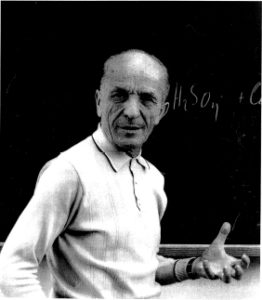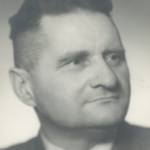Mission… and history
Mission statement of the Faculty
Faculty of Chemistry implement the mission of Nicolaus Copernicus University in Toruń. Assumptions of the Strategy of the Faculty of Chemistry are part of the University Strategy for 2011-2020 and set the following long-term objectives of the program:
- active and creative participation in research and active collaboration with leading academic centers in Poland and abroad,
- providing students the opportunities to achieve the highest level of education and comprehensive development,
- contribution to the further development of the intellectual potential of the Kuyavian-Pomeranian Voivodeship and the increase in innovation,
- the availability of modern instrument facilities and laboratories, providing excellent conditions to study, work and research, corresponding to the high standards of the foreign scientific center,
- issuing diplomas that are highly appreciated by employers,
- combining tradition and modernity – efficient management, creating friendly and effective internal and external relationships, as well as exemplary organizational culture,
- obtaining a permanent place in the elite group of the best Polish and major European universities.
Faculty of Chemistry NCU implements the mission of drawing from the rich heritage of the achievements and traditions of the University and the Faculty by using the opportunities offered by the Polish Republic and the European Union, as well as developing the democratic world and the surrounding areas. The mission of the Faculty includes the development of knowledge and understanding of the laws of nature, shaping the minds and skills of the young generation for the needs of the Torun region and the rest of the country. This mission is fulfilled by collaboration with other research institutions and industries both domestic and foreign.
Mission for Students
It is the Faculty’s objective to provide students with:
- theoretical and practical knowledge of many of the important areas of modern chemistry;
- instruction in laboratory practical work embracing organic, inorganic, analytical, physical and theoretical chemistry together with practical experience in handling chemicals and chemical apparatus safely, as well as practical exploitation of chemometrics;
- a fundamental understanding of the basic principles of chemistry through lectures and seminars and the ability to apply this knowledge in problem-solving situations;
- an insight into the essential role of chemistry in today’s society.
The Faculty will provide an opportunity for personal development in the following areas:
- to acquire learning skills through guided personal study;
- to acquire practical skills through laboratory instruction;
- to plan and carry out a substantial project in collaboration with a staff member;
- to gain experience in cooperative working through team projects and problem-solving exercises;
- to acquire skills in:
- written and oral communication;
- the application of computer technology to chemistry;
- locating information, the ability to read critically, and to judge the quality of information.
History
Chemistry has been based at Nicolaus Copernicus University since the year 1945. In the foundation documents, it has been part of the Faculty of Mathematics and Natural Sciences. Professor Antoni Basiński (photo prof.) was the main organizer of the Chemistry Department after arriving at Toruń from the Stefan Batory University in Wilno (Vilnius). In a few years’ time the main Chairs of the Chemistry Department were organised, including: Chair of Physical and Inorganic Chemistry (prof. Antoni Basinski – colloid chemistry, chemical kinetics, polymer chemistry), Chair of Organic Chemistry (prof. Witold Zacharewicz – chemistry of terpenes), Chair of Chemical Technology (prof. Ernest Pischinger – soda ash technology) and Chair of General Chemistry (prof. Alina Ulińska – chemistry of polymers).
Prof. Antoni Basiński – NCU Rector in the years 1952 – 1956, NCU Honorary Doctorate, member of the Academy of Sciences, a prominent specialist in the field of colloids chemistry, chemical kinetics and polymer chemistry, author of academic books and scripts.
 Prof. Antoni Swinarski – Rector of the NCU in the years 1962 – 1965, while in 1969-1975 Dean of Chemistry Institute, the University of Toulouse Honorary Doctorate, Coordinator and originator of Chemistry Competition (now Prof. A. Swinarski Chemistry Competition), the initiator of research in the field of coordination compounds, adsorption and catalysis.
Prof. Antoni Swinarski – Rector of the NCU in the years 1962 – 1965, while in 1969-1975 Dean of Chemistry Institute, the University of Toulouse Honorary Doctorate, Coordinator and originator of Chemistry Competition (now Prof. A. Swinarski Chemistry Competition), the initiator of research in the field of coordination compounds, adsorption and catalysis.
In December 1947 Chemistry moved to the renovated building at Grudziądzka 7. The next historical step was a division of the Department of Mathematics and Life Sciences into two new faculties: the Faculty of Mathematics, Physics and Chemistry, and the Faculty of Biology and Earth Sciences (1951). Since then, the Chemistry Department has developed new chairs, because Prof. Antoni Basiński was leading the Chair of Physical Chemistry, whereas Prof. Antoni Swinarski was head of the new Chair of Inorganic Chemistry. In the next years Chair of Analytical Chemistry headed by Prof. Halina Basińska was evolved from the Chair of Inorganic Chemistry. Formation of these Chairs completed the process of faculty development, which exhibited the main scientific areas of Chemistry at Nicolaus Copernicus University.
Over the years, the number of faculty members has increased, and new research directions appeared, such as: chemistry of polymers and polyelectrolytes in the condensed phase (prof. A. Narębska), physical chemistry of surface phenomena, adsorption and catalysis (prof. J. Siedlewski), physical chemistry of polymers in solution (prof. L. Huppenthal), the chemistry of organometallic compounds (prof. A. Uzarewicz), heterocyclic compounds (prof. T. Lesiak), aromatic compounds and dyes (prof. J. Gronowska), copolymers and polyelectrolytes (prof. Z. Wojtczak), the chemistry of coordination compounds (prof. A. Łodzińska), photochemistry of polymers (prof. A Kamińska), radiation chemistry (prof. W. Szymański), technology of soda ash and mineral salts – (prof. H. Koneczny and prof. J. Tomaszewski), environmental chemistry (doc. St. Kaminski) and instrumental analysis (doc. M. Czerniawski). Moreover, cooperation with many research centers in Poland and abroad (United Kingdom, France, Germany, Russia, etc.) was developed.
In 1964, prof. A. Swinarski organized the first edition of Chemistry Competitions for High School students. Over the years, Competition has developed in teaching and educational project of national importance. The Prof. Swinarski Chemistry Competition is organized annually by the NCU Faculty of Chemistry, in collaboration with the Department of Education. In 2014, the 50th Anniversary of the Competition was organized.
In the year 1969, the Institute of Chemistry evolved as an independent research unit of the Faculty of Mathematics, Physics and Chemistry with Prof. A. Swinarski as the first Director of the Institute (1969-1979). In 1970 Institute was dived into research and teaching divisions. Meanwhile, new research groups were formed by: prof. L. Borowiecki, prof. M. Czerniawski, prof. J. Gronowska, doc. S. Kamiński, prof. T. Lesiak, prof. A. Łodzińska, prof. A. Narębska, prof. J. Siedlewski, doc. B. Siła, prof. W. Szymański, prof. J. Tomaszewski, prof. A. Uzarewicz, prof. Z. Wojtczak and prof. M. Zaidlewicz. In 1972 the Institute was relocated to the present buildings at the new Bielany University Campus. In 1978 the second building of the Institute with Technology Hall and workshops were opened. Construction and completion of the second building was possible due to the extensive cooperation of the Institute of Chemistry NCU with chemical industry from the region: Zakłady Sodowe Mątwy, Janikowo, Zakłady Chemiczne Bydgoszcz, Telfa Bydgoszcz, Foton Bydgoszcz, Polchem Toruń, Elana Toruń, Azoty Włocławek and funds of the Ministry of Chemical Industry. In cooperation with industry were involved professors: A. Swinarski, H. Koneczny, T. Lesiak and J. Tomaszewski. Moreover, the Central Laboratory for analytical services in the Institute of Chemistry with the most valuable equipment was established by Prof. Swinarski.
Chemistry doctoral studies (PhD Chemistry) were established in 1978, and in 1987, after several years of suspension, were reactivated.
The political changes that had taken place in Poland at the beginning of the nineties gave rise to new views, conditions, and educational offer. In 1993, the Faculty of Mathematics, Physics and Chemistry has been splitted into three faculties and one of them was the Faculty of Chemistry. The first Dean was Prof. Marek Zaidlewicz, whereas Prof. Józef Ceynowa and prof. Ludwik Kreja were Vice-Deans. In the following years, this function was held by Prof. Józef Ceynowa and prof. Jerzy Łukaszewicz.
Further development of Faculty resulted in new research topics: synthesis and reactions of organo-boron compounds and asymmetric organic synthesis (prof. M. Zaidlewicz), enzymatic catalysis in membrane systems (prof. J. Ceynowa), conductive polymers (prof. W. Czerwiński), transition metal complexes and magnetochemistry research (prof. A. Grodzicki), adsorption on zeolite materials (prof. M. Rozwadowski), adsorption of carbon materials (prof. G. Rychlicki, prof. J. Zawadzki), crystallization and kinetics of inorganic salts systems (prof. M. Trypuć). In 1994. prof. B. Buszewski (environmental chemistry, chromatography) was employed, whereas prof. A. Chostenko (radiation chemistry) in 1996. Department of Quantum Chemistry, led by the world-famous scientist prof. A. Sadlej was established in 1997. Cooperation with the scientific centers in Europe, the USA and Japan was developed in the nineties.
In addition to the existing specialization of General Chemistry, two new Environmental chemistry and Polymer chemistry were implemented.
In 1996-98 Faculty received a Tempus grant, focused on the transformation of the Master’s degree studies into the European system of three-year undergraduate and two-year Master’s studies. Faculty was one of the first in Poland, which introduced the European Credit Transfer System (ECTS). The number of students admitted to the first year of study reached 300, whereas the total number of students exceeded 900 people.
In 2007, Faculty returned to the Chair structure, where teaching and research duties were performed. Since 2008, the faculty of Chemistry developed different teaching specializations: biomedical chemistry, chemistry and food analysis, the chemistry of cosmetics, inorganic chemistry in human life, environmental chemistry, chemistry of polymers, nanomaterials and nanostructures, computational chemistry and general chemistry. After 2010, new teaching courses leading to the Bachelor’s degree and engineer title were opened: Cosmetic Chemistry, Chemistry and Food Technology, Materials of Modern Technologies. Faculty of Chemistry offers also doctoral studies and a wide range of postgraduate courses: Postgraduate studies in chemical rescue and safety, Postgraduate studies in Occupational Health and Safety, Analysis in Environmental Protection and Management of chemicals in manufacture with a particular focus on the REACH regulation.
The NCU Faculty of Chemistry Board is entitled to confer the degree of:
- Ph.D. in chemical science (Doctor of Chemistry),
- Doctor of Science in Chemistry (Habilitation).
As a result of the high level of scientific research and the number of world-class experts at the Faculty of Chemistry, it has always been rated the highest category in the Polish evaluation of scientific units (A).


 ul. Gagarina 7, 87-100 Toruń
ul. Gagarina 7, 87-100 Toruń